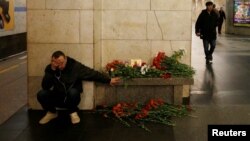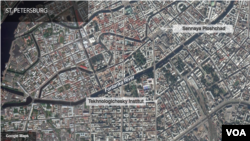Russian investigators have identified Kyrgyz-born Akbarzhon Dzhalilov as the suicide bomber who carried out Monday's deadly attack on a crowded subway train in St. Petersburg.
The country's Investigative Committee says it discovered the burned remains of the man who they believe is behind the attack that killed 14 people and left nearly 50 others injured. The Committee also said investigators found Dzhalilov's DNA on an unexploded bomb planted in another subway station in St. Petersburg on Monday.
Dzhalilov was identified as the bomber earlier in the day by intelligence authorities in Kyrgyzstan, who said he had obtained Russian citizenship, according to "preliminary data."
The explosion Monday was so powerful it blew a hole through the thick metal doors of a subway car.
Moscow took what it called "additional security measures" on its metro.
St. Petersburg authorities shutdown a Metro station at the city's Sennaya Square for several hours Tuesday after receiving a bomb threat. VOA correspondent Daniel Schearf retweeted photos of emergency personnel responding to the threat.
Three days of mourning
Officials in St. Petersburg have declared three days of mourning.
President Putin was in St. Petersburg for a meeting with Belarusian President Alexander Lukashenko. Putin brought flowers to the subway station, where a memorial of flowers and candles grows.
The White House says U.S. President Donald Trump called Putin after the attacks and to express his condolences and offer support to the Russian people. The White House said the two presidents agreed terrorism must meet a swift end.
A terrorist attack would be quite serious, says the director general of the Russian International Affairs Council, Andrei Kortunov.
"Because we have not experienced anything like that for a long period of time in Russia. And, definitely we are back to where we were some 10 or 12 years ago when these explosions unfortunately took place on a more or less regular basis," he said.
The last subway attack was in Moscow in 2010 when female suicide bombers connected to an Islamist insurgency in Chechnya were blamed for killing at least 33 people. Earlier bombings on the Moscow metro in 2004, also linked to Chechen terrorists, killed nearly 50 people.







